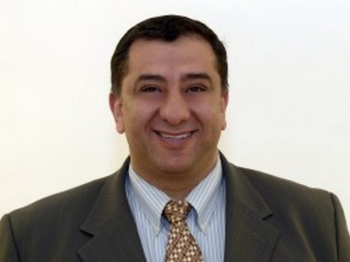A Palestinian Muslim approach to non-violence

Professor Mohammed Abu-Nimer serves as Director of the Peacebuilding and Development Institute at American University. He is also Senior Advisor to the King Abdullah bin Abdulaziz International Centre for Interreligious and Intercultural Dialogue (KAICIID) in Vienna. He has conducted interreligious conflict resolution training and interfaith dialogue workshops in conflict areas around the world and written extensively on peacebuilding and non-violent responses to conflicts.
You were born into a Palestinian family living in Israel. What was your perception of the situation in that land when you were a young student? What did you decide to do? What is your feeling right now?
I grew up in the North part of the country and I attended university in Jerusalem between 1981 and 1986. During that period living in Israel-Palestine was challenging also because of the occupation in the West Bank and the struggle for equal rights and citizenship. I had the chance of being in contexts where Arabs and Jews could meet and I devoted a great deal of my time and my life to facilitate encounters between Palestinians and Israelis. In fact many Israeli Jews lived nearby Palestinians but they never had the chance to meet and talk with them. So we started an encounter program to support the idea of living together and coexist in the same land.
This happened before Oslo took place in 1993 and it became fashionable to talk about peace issues. But at that time it was a very pioneer and new idea considering the challenge we had as Palestinians living in Israel to work against discrimination and for equal rights.
Let’s talk about peacebuilding and Islam: what are the important resources Muslims can use from their religious tradition to work for peace and conflict transformation?Pope Francis often talks about “a culture of mercy”. What role may mercy play in the Islamic context?
I have worked in many countries like Niger, Pakistan, Iraq and I have always believed that Islam as a religion has a solid framework to promote peace, coexistence and harmony. Non violence in itself is part of Islamic theology. In areas of conflict, when you work with Muslim communities promoting peacebuilding, you can rely on values like forgiveness and reconciliation which are part of the faith. The problem is about the lack of functioning political, social, educational and economic infrastructures. That makes challenging to speak and apply the Islamic idea of peace.
Regarding the issue of forgiveness, mercy and reconciliation, I find inspiring to talk about it and see similarities with Christianity. In Islam, if you forgive you gain a greater reward than choosing revenge and fighting back. As for Mercy, this is one of the names of God in Islam. Any action a Muslim does should be made in the name of the Merciful. The concept of Mercy is very foundational in Islam and you can see it in the Qur’an , in the prophetic tradition (Sunna) and it was not difficult for Muslims to relate to Pope Francis’ message in that regard.
We just celebrated the 30th anniversary of the interreligious gathering in Assisi for the World Day of Prayer for Peace. In your opinion, what role does prayer play for groups of believers in conflict transformation?
Prayer is a powerful form of building alliance and relationships and conflict transformation is all about building relations. Any form of spiritual rituals can be a powerful tool and a way to feeling the pain of the other and enter in solidarity with those who are the victims. Everyone can engage in that practice one way or the other, ritualized or not, and it gives people the chance to reflect and take things beyond.
For example, when Muslims go to Mecca for the pilgrimage there are about 2 million and a half people together, connecting with each other and calling to peacebuilding and coexistence, the same way as Christians do when they gather in places like Jerusalem or Rome. Praying together for peace sends an incredibly powerful message.
Interview by Elena Dini
(April 2017)



